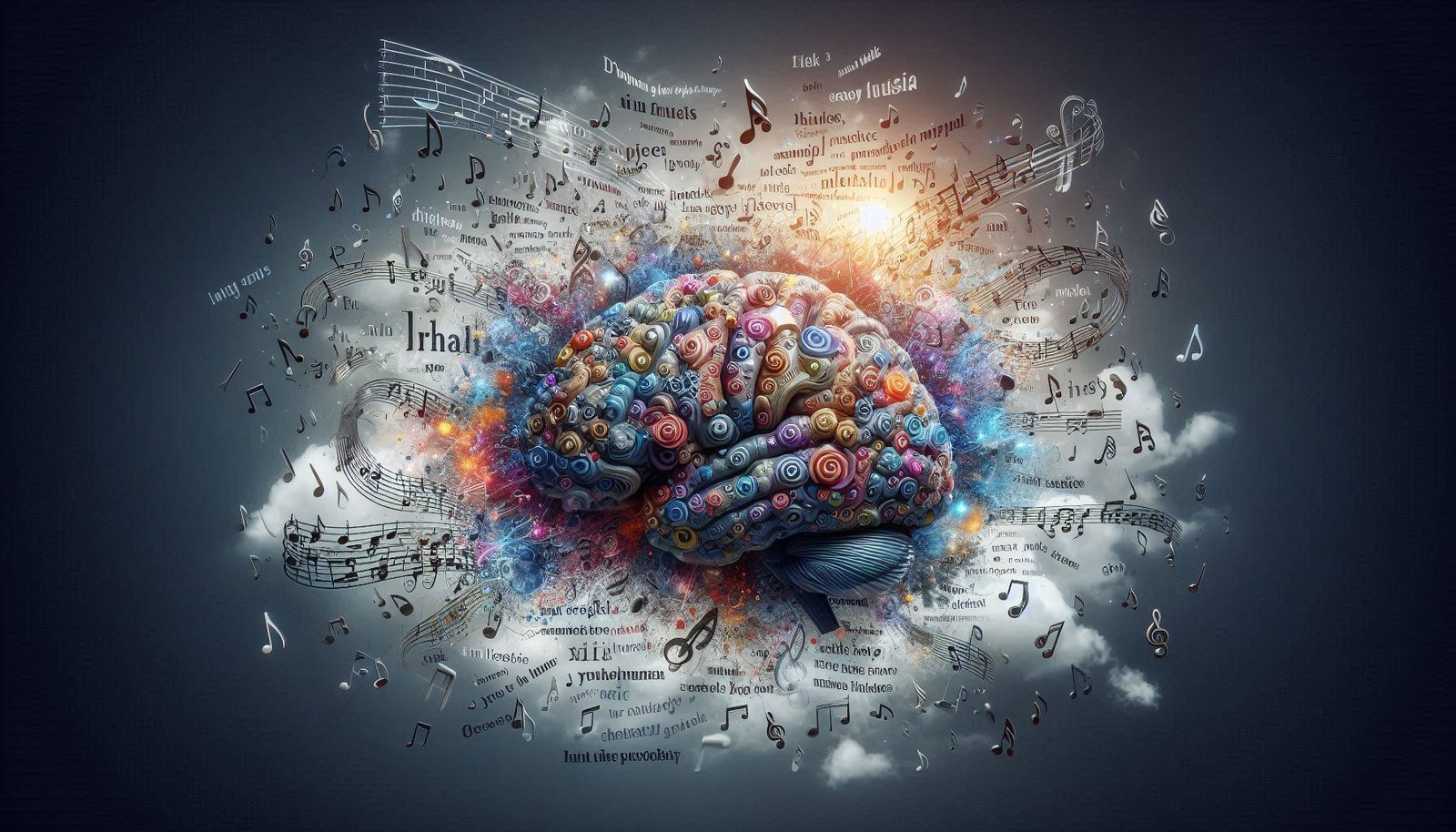
Music has this magical ability to make us feel all kinds of emotions—joy, heartbreak, nostalgia, and even empowerment. But there’s something deeper going on when you find yourself singing a particular lyric over and over again, stuck in your head like it was glued there. Why do certain phrases from songs have this grip on us, even long after the music stops playing? In this article, we’ll explore the psychology behind why certain lyrics stick with us and how songwriters use this to their advantage.
The Science of Music and the Brain
First, let’s break down the relationship between music and the brain. When you hear a song, multiple areas of your brain light up like fireworks—your auditory cortex processes the sound, while your frontal lobe and hippocampus dig into the lyrics. This interaction between different brain regions helps explain why music, and more specifically lyrics, can create such a powerful emotional and cognitive response.
Music taps into your brain’s reward center, releasing dopamine—the “feel good” neurotransmitter. That’s why certain songs give you goosebumps or make you want to move. When it comes to lyrics, the brain is processing both the words and the emotions behind them, which can lead to those catchy phrases that seem to stick in your memory forever.
The Catchiness Factor: Repetition Is Key
Ever wonder why you can’t stop humming the same line from a song? It’s not just you—there’s science behind it. One of the main reasons lyrics get stuck in your head (what researchers call an “earworm”) is due to repetition.
Repetition, both in melody and lyrics, helps embed the song deeper into your memory. Think of the most popular songs across genres—whether it’s a hip-hop banger or a pop anthem, you’ll notice a lot of them have repetitive hooks or choruses. It’s a technique used to make sure that a song becomes memorable, and songwriters are experts at it.
For example, a song like “Shape of You” by Ed Sheeran is packed with repetitive phrases like “I’m in love with the shape of you.” The repetition makes the song easy to remember and keeps it swirling in your mind long after it’s ended.
Emotional Resonance: Lyrics that Speak to Our Experiences
Lyrics that tap into our emotions tend to stay with us the longest. Whether it’s a heartbreak anthem or an empowering ballad, when we hear a song that mirrors our own experiences, it resonates on a much deeper level.
Take Adele’s hit “Someone Like You.” The lyrics about lost love and heartbreak resonate with anyone who has been through a tough breakup. The song’s emotional depth and relatability make it one of those tracks that stick with you long after you’ve listened to it.
In essence, songs that speak to universal human experiences—love, loss, hope, or despair—are more likely to stay with listeners. When you hear a lyric that hits close to home, your brain makes a stronger connection to it, increasing the chances of it sticking around.
Word Play and Clever Lyrics
Some lyrics stick with us because they’re just straight-up clever. Songwriters often use wordplay, metaphors, and allusions to create lyrics that feel fresh and memorable. When your brain encounters something clever or unexpected, it pays more attention to it.
Take Lil Wayne’s line in “6 Foot 7 Foot”: “Real Gs move in silence like lasagna.” It’s a clever use of a metaphor and also plays with the silent “G” in lasagna. The unique phrasing grabs your attention and sticks in your memory because it’s not something you hear every day.
Clever lyrics that make you stop and think, laugh, or appreciate the wit behind them are more likely to stay in your mind. They stand out because they’re not predictable, adding an extra layer of engagement with the listener.
Simplicity and Directness
Sometimes, the lyrics that resonate most are the simplest ones. You don’t always need complex metaphors or deep philosophical musings to create a powerful lyric. In fact, direct and simple language often has the most impact because it’s easy to understand and connects with listeners on a more personal level.
A great example of this is Bob Dylan’s “Blowin’ in the Wind.” The lyric, “How many roads must a man walk down before you call him a man?” is simple, but it’s also profound. Its straightforwardness makes it accessible to a wide audience while still leaving room for interpretation.
Simple lyrics are easier to remember and can be more relatable, which is why they often stick with listeners for years to come.
Cultural Relevance and Social Impact
Songs that tap into cultural moments or movements also tend to have lasting power. When lyrics speak to something bigger than ourselves—whether it’s a political movement, social change, or generational mood—they resonate with listeners on a collective level.
For example, Childish Gambino’s “This Is America” addresses themes of violence, race, and American society. The song’s lyrics, paired with its striking visual imagery, became a cultural touchpoint, ensuring it would stick in the minds of listeners for a long time.
Similarly, songs like “Fight the Power” by Public Enemy or “Imagine” by John Lennon have become anthems not just because of their musical quality, but because they spoke to the times and cultural movements they were a part of.
Rhythmic Flow and Phonetics
There’s also a rhythmic aspect to why certain lyrics stick with us. The flow of words, the way they sound, and how they fit with the beat of the music all contribute to their memorability. Certain combinations of sounds—like alliteration or internal rhyme—make lyrics more sonically pleasing and easier to recall.
Hip-hop is a genre that excels at this. Artists like Kendrick Lamar and J. Cole are masters of rhythm and flow, using intricate rhyme schemes and alliteration to create lyrics that are both impactful and catchy.
Take Kendrick Lamar’s “Alright,” for instance. The repetition of the phrase “We gon’ be alright” coupled with the rhythm of the beat creates an almost hypnotic effect, making the lyric hard to forget.
Music and Nostalgia: The Power of Memory
Have you ever heard an old song and been instantly transported back to a specific time or place? That’s the power of music and nostalgia. Certain lyrics can trigger memories, emotions, and even sensory experiences, which is why they can stick with us for decades.
Nostalgia is a powerful tool in music, and many artists tap into it by writing songs that remind listeners of their own past experiences. Whether it’s a song from your high school days or a track that reminds you of a summer road trip, these lyrics are more likely to stay with you because they’re tied to meaningful memories.
Fleetwood Mac’s “Landslide,” for instance, is often associated with moments of reflection or change, making it a track that many listeners hold onto emotionally.
The Role of Repetition in Popular Music
While we’ve already touched on repetition as a key factor in creating memorable lyrics, it’s worth emphasizing its role in popular music. In today’s music landscape, many chart-topping hits rely heavily on repeated phrases, hooks, and choruses. This is no accident.
Repetition not only helps with memorability, but it also creates a sense of familiarity, making the song feel like something you already know even when you’re hearing it for the first time. It’s why artists like Taylor Swift, Drake, and The Weeknd consistently produce hits that dominate the charts.
Drake’s “Hotline Bling,” for example, repeats the phrase “You used to call me on my cell phone” over and over again, making it nearly impossible to forget.
Conclusion: The Magic of Lyrics
There’s no single reason why certain lyrics stick with us—they do so for a variety of psychological, emotional, and cultural reasons. From clever wordplay to emotional resonance, repetition, and nostalgia, lyrics have the power to embed themselves in our minds and stay with us for a lifetime.
So, the next time you find yourself humming a line from your favorite song, remember there’s some serious psychology behind why it’s stuck in your head. Lyrics are more than just words—they’re a reflection of our thoughts, emotions, and experiences, which is why they can have such a lasting impact on us.
Music has the power to move us, and lyrics are often the vehicle that drives that emotional connection. Whether you’re vibing to a catchy pop song or reflecting on a deep, introspective ballad, the psychology of lyrics is working its magic behind the scenes, making sure those words stay with you long after the music fades away.


